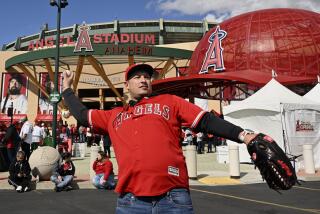$1.4-Billion Disneyland Expansion Approved
ANAHEIM — The historic partnership between the Walt Disney Co. and Anaheim, begun when Disneyland opened 41 years ago, was again sealed Tuesday with the City Council’s vote to spend millions of dollars to make possible a new $1.4-billion Disney theme park.
The council’s final 5-0 vote commits the city to pay up to $546 million in public funds for improvements related to the Disney project and to a major expansion of Anaheim Convention Center across Katella Avenue from the park. It follows months of intense negotiations and culminates more than six years of dramatic twists and turns, which began when Disney first announced it was considering building a second theme park in Anaheim.
Mayor Tom Daly called the vote a “big step into the future. I can’t wait for the project to begin so we can enjoy the benefits as soon as possible.”
An exuberant Paul Pressler, president of Disneyland Resort, expressed both excitement and relief that the company now has all of the clearances it needs to begin construction next spring. The addition is expected to open in 2001.
“It certainly is an historic moment for Anaheim and for Disneyland,” Pressler said. Referring to Walt Disney, he added, “We’re just glad we can continue in his vein.”
The new Disney development supersedes a splashy $3-billion resort the company proposed for the same site in 1991 but abandoned last year as too ambitious. This summer, the company unveiled its plan for a smaller attraction. It includes a 55-acre theme park called Disney’s California Adventure, a 750-room luxury hotel and a 200,000-square-foot shopping, dining and entertainment complex called Disneyland Center.
In all, $450 million of city money will be invested in improvements to the city’s tourism area. This includes street improvements, landscaping, utilities and a $90-million parking garage to be used mostly by visitors to the new theme park and, on a limited basis, by Convention Center visitors. The other $96 million will come from existing state, federal and regional transportation funds.
The city plans to issue $395 million worth of bonds to finance much of the work. Increased revenue from hotel and sales taxes from tourists and property tax revenue generated within the Disneyland Resort area is expected to pay off the bonds. In case of a shortfall in revenue, Disney has guaranteed the bond debt, agreeing to step in and pay investors if the city can’t.
City officials insist that the project will not burden city taxpayers and in the end will strengthen the city economically.
The city’s tourism area now contributes nearly $11 million a year in tax revenue to city programs. The expansion, coupled with other projects, could boost that by $6.1 million a year, according to a report released by the city last month.
For image-conscious Disney, gaining the council’s unanimous approval for the expansion was considered crucial.
City and Disney officials were criticized last spring when the city agreed to pay 30% of a $100-million renovation of Anaheim Stadium as a condition of Disney’s purchasing controlling interest in the California Angels baseball team. The critics said Anaheim was not guaranteed a means of recouping its investment. The issue bitterly divided the City Council and was narrowly passed, 3 to 2.
Although Councilmen Bob Zemel and Tom Tait voted against the baseball deal, both sided with their colleagues on Tuesday in an unusual display of solidarity.
“I believe this deal is better than the last one,” Zemel said. “This time, there is a revenue stream for the city, and it is a true partnership. This transaction is good for Anaheim taxpayers.”
The plan always appeared to have the blessing of at least a majority of the council and received minimal public opposition. Hundreds of Disney faithful have attended rallies and filled public meetings to show support.
Tuesday was no different as more than 30 pro-Disney speakers lined up to extol the positive aspects of the deal at a hearing that went on for more than three hours.
Most of them were members of Westcot 2000, a group formed in the early 1990s to support the Disney expansion. Stan Pawlowski, co-chairman of the group, said Disney and Anaheim are “like love and marriage and a horse and carriage. After 41 years, you can’t have one without the other.”
Former Anaheim Mayor Jack C. Dutton, 86, was among those who urged approval.
“I’ve walked in the shoes of each of you up there,” he told the council. “It’s really time to quit talking and start pouring concrete and hammering nails.”
But not everyone was pleased.
A group of parents from the Anaheim City School District said they were concerned about the impact that new jobs from the development will have on schools.
“We want the city to remember that as they sign this agreement with Disney, it’s going to impact our school district,” said Maureen Christensen. “They’re going to send more children to our schools when they bring in more jobs and affordable housing.”
Longtime Anaheim resident Tim Murphy questioned whether the company was strong-arming the city into an unfair deal.
“Does the city of Anaheim need these things or is it Michael Eisner [Walt Disney Co. chairman] who needs these things?” Murphy asked. “We are not in the city of Disney; they are in our city. But it all boils down to what Disney wants.” Still, Tuesday’s smooth passage was dramatically different from the boisterous hearings on the original $3-billion project, which residents, local school districts and a neighboring city filed lawsuits to stop.
Although Disney and city officials were celebrating Tuesday, a statewide anti-tax initiative on the November ballot threatens their carefully crafted plan.
The initiative, sponsored by the Howard Jarvis Taxpayers Assn., would require approval by voters, retroactively, of all new taxes and tax increases implemented after January 1995. This would include the hotel bed tax increase of 2 percentage points passed last year for the Convention Center expansion and tourism area improvements.
The city has placed a measure of its own on the November ballot, asking voters to retroactively ratify the bed tax increase.
City Manager James D. Ruth said the deal is consistent with the city’s willingness to make “bold moves.”
“We cannot be shortsighted and rest on our laurels,” Ruth said.
Also contributing to this report was Times correspondent Bonnie Hayes.
More to Read
Sign up for Essential California
The most important California stories and recommendations in your inbox every morning.
You may occasionally receive promotional content from the Los Angeles Times.









